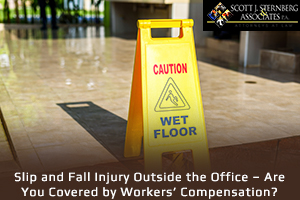The workers’ compensation policy owned by an employer will pay for the medical expenses incurred by an employee who suffers a work-related injury.
There will also be a payment of possibly two thirds of their average weekly wage for the time lost while they recover from those injuries, if the employee qualifies. But, the injury must be work-related, and the employee must be performing duties that are within the scope of their employment. There is some confusion, however, as to when an employee is technically considered as being at their place of employment when it comes to a slip and fall injury.
I Was On My Way to Work, Do I Have a Workers’ Compensation Claim?
An employee on their way to work in a car will not be covered for any injuries suffered during their commute, and they will not be covered if traveling by public transportation or even possibly walking. Florida – and other states – refer to the coming and going rule. There may be some circumstances where this rule is not applicable. A slip and fall injury, for instance, may happen on the employer’s premises, and since they have control of the area – which includes the parking lot – and even if the employee has not clocked in the employer’s workers’ compensation policy may be used if a claim is made. It would depend on the circumstances, but this is one workers’ slip and fall claim that may be covered.
The employer will be best served by reporting the incident to their workers’ compensation insurance carrier, and it will then be determined if the workers’ comp claim is valid. The control of the premises is a very important factor. If the employer owns the premises, they are obviously in control it. However, if the employer rents the space in the building and the landlord has control of the premises, that may be another matter.
Who is in Control of the Premises with the Workers’ Compensation Incident Occurred?
The landlord will be the one who takes care of the premises and is responsible for its upkeep, and that would seem to leave the employer out of the picture. Other factors would have to be considered. Did the employee fall because the snow removal contractor did not perform their job properly? Was something left behind by another outside contractor that led to a trip and fall by the employee? There may be many factors that make the insurance carrier question whether it is a valid workers’ compensation claim.
These different considerations are also important to the employee in making sure that the right entity is help responsible for giving them the proper compensation for their injuries. In Florida, you may be able to collect workers’ compensation in a slip and fall on the premises – even if it isn’t owned by the employer. But you may also be able to sue a third party for other benefits, if they were somehow negligent as in the examples above.
Even an off-premises slip and fall injury can be covered by workers’ compensation. If a person is at a trade show and there is a slip that leads to an injury, the employer’s coverage could be used as long as the employee was at the trade show to represent the employers’ product or services.
All of these injuries can potentially qualify for workers’ compensation, and the best plan for the employee is to request to fill out an incident report as quickly as possible. Contacting an experienced will be extremely beneficial in this process. The attorneys at Sternberg | Forsythe, P.A. will make sure all the proper forms are filled out and determine if going forward in a workers’ compensation claim or third-party suit will be best for your specific situation.
Additional Reading:

